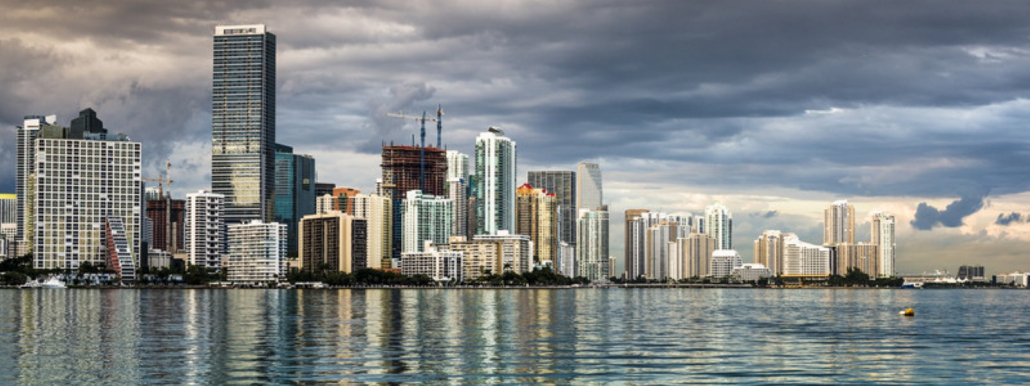‘The Floodgates Have Opened’: 2020 Sees Surge Of Business Transplants To South Florida
Anthony De Yurre had “the Miami talk” down to a stump speech. The Bilzin Sumberg partner had become the point person at the firm for fielding questions from people contemplating uprooting themselves from wherever they were living and making the move to the Magic City.
“I think a lot of people were playing with the idea, or considering it at some point in time — the cost of Miami, the opportunities in Miami, doing their due diligence,” said De Yurre. “After the Trump Administration eliminated deductions on state and local taxes, the frequency of ‘the talk’ increased. But it was still mostly with older workers looking to move up their retirement schedules.”
Then came 2020. Sparked in part — but not entirely — by COVID, local real estate professionals like De Yurre say they are receiving more inquiries than ever from businesses and individuals looking to land in South Florida.
“They look at Miami as having the weather, the quality of life, a place to avoid the winter,” De Yurre said. “But now with COVID, it’s just a completely different conversation.”
The prevailing sentiment is that the usually steady stream of transplants South Florida has always attracted has accelerated this year to a pace hardly seen before.
“I think COVID has opened up the floodgates,” said Danet Linares, vice chairman at Blanca Commercial Real Estate. “They’re locked down in their homes, and with technology enhancing the work environment, they’re now saying I can work from home from anywhere.”
Alex Taub, founder of startup networking app Upstream, which has already been the subject of a TechCrunch.com profile, is a textbook case. Taub and his family decided to leave New York City for Miami indefinitely in April after they all tested positive for COVID (they’re all fine now). They had also considered Los Angeles and Austin among warm weather destinations, but settled on Miami based in part on a positive stay at a friend’s house in Mid-Beach last winter. They signed a one-year lease in a 3,500 square foot, three-bedroom house with a pool in North Miami.
“It was comparable to what we were paying in New York — but three times the space,” Taub said.
While COVID has made it harder to develop friendships in his new town, he said, he is grateful that his eldest daughter is able to attend school in person. Wednesday, New York City announced it was once again shutting down its schools.
Florida’s tax structure is a definite bonus.
“The state tax situation here is amazing,” Taub said. “Going from New York to Florida is a revelation. That might keep us here for a little while longer.”
Joining Taub among a wave of tech professionals is Harry Hurst, founder of Pipe, a platform for selling the revenues earned from subscription products and services off to investors. In an email, Hurst, who is British, said he left for Miami after many years in Los Angeles to take advantage of its East Coast connections, its growing tech community and proximity to other investors.
Taub and Hurst are part of a COVID-fueled techie migration to South Florida. Their presence demonstrates that Miami’s selling points are resonating beyond the usual constituencies of finance and real estate professionals.
Finance Pros
Those popular sectors are still drawing strong.
Ian Campbell, CEO of Nucleus Research, a research and advisory firm, said in email the arrival of COVID prompted him to take a fresh look at Nucleus’ office space in Boston.
“With the staff working from home at the time, a move to Miami would not create the business disruption it might have at any other time,” Campbell said in an email. “We were always aware that Miami was a growing area and it had been on my long term plans for expansion… COVID gave me the opportunity to make a complete and clean move. With the number of private capital firms and family investment offices here in South Florida, it made long-term business sense for his company to homestead in Miami.”
Other financial firms that have announced moves amid COVID include Marathon Asset Management, whose CEO Bruce Richards told Bloomberg his firm had chosen Miami over other cities including Charlotte and Atlanta. Bloomberg also reported in September that Chicago-based Balyasny Asset Management had decided it would open an office in Miami.
A spokesman for Marathon declined to comment for this article. A spokesman for Balyasny declined to comment.
In September, the Miami Herald reported New York-based investment firm Hidden Lake Asset Management, along with New York-based luxury car storage company Hagerty Garage and Social and London-headquartered public relations company Purple, had all signed leases for commercial space in South Florida.
Jonathan Miller, President and CEO of Miller Samuel Inc., a real estate appraisal and consulting firm, said the activity he is seeing now from northeastern residents is much more substantial than what occurred after state and local tax deductions were eliminated.
“When the SALT tax change passed in Jan. 2018, the real estate community in Florida was thinking that a switch had been flipped, and that everyone would be loading up their cars and trucks and moving to Florida,” Miller said. “That didn’t happen as scripted. It was much more modest. There was an uptick in activity over the last couple of years, but not a surge. The pandemic is proving much more of a catalyst. It’s almost as if, like many things, COVID has become the disruptor. It put people who had been on the fence the last decade or so over the top.”
Luxury Housing, Office Appeal
Miller says the evidence is two-fold: All five Florida counties he tracks — Hillsborough, Pinellas, Palm Beach, Broward and Miami-Dade — are seeing strong growth in their real estate markets. At the same time, the New York metro area, which he also tracks, is seeing activity plateau or ease.
The strongest growth is occurring at the highest end of Florida’s markets, he said. In Miami-Dade, the number of new signed contracts for properties worth at least $1 million increased to 201 in October 2020 — more than double the 85 contracts signed in October a year ago. In Broward, they jumped from 33 to 45. Miller also cited studies showing Florida as the top destination for individuals moving during COVID.
A series of new real estate projects across South Florida are seeking to capitalize on the migration trend.
“Brickell Flatiron, completed last year, is seeing a surge in interest for its remaining properties,” said developer Ugo Colombo. “After a near-freeze in activity from about April to September, inquiries started cranking up. As prices on high-end single family homes in the area soared, consumers turned to turn-key condos. While much of the interest is concentrated among northeasterners, there are also inquiries from Mexican citizens, who maintain easier travel access to the U.S. than most Europeans and South Americans.”
Related Cos. is also underway on a new office tower in West Palm Beach that is set to capture the wave of relocations.
And in Fort Lauderdale, developer Stiles Corp. is about to open the first Class-A offices in the city in more than a decade. The mixed-use Main Las Olas project is designed to raise Fort Lauderdale’s profile as an alternative to the Miami and West Palm Beach centers of gravity.
Many of those who looked to camp out in the region until COVID blew over are now contemplating becoming permanent South Florida residents, according to Lyle Stern, president of Koniver Stern commercial real estate brokerage on Miami Beach. Stern is part of an effort to lure new tenants to a proposed business district along Lincoln Road.
“Yes, some people are just renting homes and condos, but the level of investment in buying homes here was significant and calibrated,” Stern said “It was, ‘We’re going to live here, enroll our kids in school here, be part of the community here. This is going to be our home.’”
Beyond COVID
While COVID may be a catalyst, core reasons for coming to South Florida remain solid: access, taxes and lifestyle.
Boston Private Wealth LLC opened its Miami office in the fourth quarter of 2019, bringing on some 25 workers for a 5,500 square-foot space at 1441 Brickell Avenue.
“You have to have a presence in this market if you’re an East Coast firm,” said Pat Dwyer, managing director at Boston Private and head of strategic business development at the firm. “Being established in Florida is a big thing, just like on the West Coast you now have to have a presence in Texas, because that’s where people are going.”
The most high-profile group to announce a new Miami office this year was global investment firm Blackstone. Last month, chief technology officer John Stecher told the Miami Herald the firm chose Miami from among a host of options for its new tech workforce thanks to the area’s talent pool, lifestyle and proximity to New York.
Nitin Motwani, Managing Director of Miami Worldcenter Group and co-chair of the Miami Downtown Development Authority’s Enterprise Committee, called Blackstone’s move “one of the longer overnight success stories I’ve been involved in.”
“We’ve been educating the financial community on everything that’s been happening in Miami,” Motwani said. “So when Blackstone started researching where to set up an outpost, all the groundwork came to fruition.”
The Blackstone deal is evidence of the community’s commitment. Blackstone received state, county, and local financial incentives to make its move, including funds from the DDA’s new “Follow The Sun” campaign, which awards firms up to $150,000 over three years for moving to the city’s core.
Said Motwani, “The DDA bent over backward, in partnership with the Beacon Council and Enterprise Florida, to show that this is a big deal for us, to welcome them with open arms, and do whatever could be done to be supportive and facilitate.”
Blackstone began its search for a new office prior to COVID, and while the pandemic may have affected the process itself, Blackstone’s reasons for relocating here show companies are already looking past the virus to the many attributes the area brings.
Mike Finney, president and CEO of The Beacon Council, Miami-Dade’s economic development arm, said the organization is celebrating its most successful year in 20 years. In 2020, it helped bring 2,904 direct jobs to Miami-Dade through relocations or expansions.
“In fact, almost all of these projects were started prior to COVID”, Finney said. “It was the traditional value proposition of Florida. Business friendly, the quality of living, its great sense of place, housing amenities — all the usual things about this region.”
New To The Market
Companies that have expanded or relocated to Miami in the past 18 months:
- New York-based global investment group Blackstone (215 employees)
- California-based tech firm ShiftPixy (50 employees)
- Chicago-based Balyasny Asset Management (up to 30 employees)
- Bahamas-based Adi Dassler Family Office (25 employees)
- Wealth management group Boston Private (20 employees)
- Boston-based technology advisory Nucleus Research (15 employees)
Source: Miami Herald



